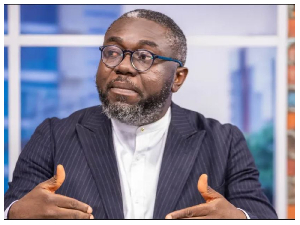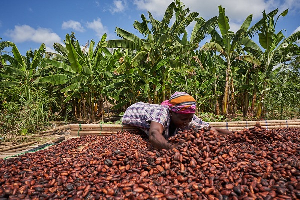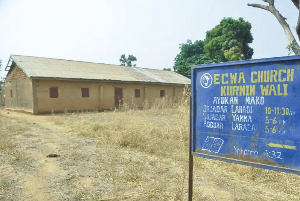Africa's soccer fiesta held every two years has become a platform for the international sporting media to really assess the potential of the continent ever winning the global championship- the World Cup.
As we get ready for another fiesta in Mali today, there are a number of international media outfits that have already either planted their men in the Sahelian country or are just about to be sent there.
A trip to the Malian Embassy near the Ministries revealed a number of Canadian, British and French nationals seeking visas to travel via Ghana Airways to Bamako principally for the 2002 Africa soccer jamboree which kicks off with the hosts, the Eagles of Mali encountering the Lone Stars of Liberia led by former world player, George Oppong Weah.
The Malians as hosts will be playing with tremendous support but also tensed due to the youthfulness of their team. The likes of Seydou Keita of Lyon of France, Soumaila Coulibaly of FC. Freiburg of Germany and the rest of the Malian European brigade, have seen an uninterrupted six years of nurturing and togetherness since their Salif Keita Academy days through to the Africa Under 20 tournament in Ghana in 1999 till date, and is a dream team of the future.
The Malians have no real credible record in the competition apart from their elusive attempt to capture the trophy in 1972 with a 2-3 toss to the Congo. They therefore see this year as theirs.
Their hopes have been reinforced by the fact that almost 65% of all hosts have, at one time or the other, won the trophy. And as if by divine intervention, the Eagles are opening the tournament with a dispirited and troubled Liberia's Lone Stars affected by the traumatic exclusion form the World Cup after a heroic show, and also wranglings over allowances and bonuses.
The same divine intervention is what most Ghanaians are counting on to save the cherished but recently degraded soccer image of the once dreadful Black Stars.
Twenty years ago, Ghana's triumph at the 13th edition in Libya was divinely controlled when two months after toppling the late Limman government, ex-president J.J. Rawlings torpedoed Hilla Limman's unfortunate decision to withdraw the Stars from the competition by sending the Stars hurriedly to the tournament.
And throughout that historic competition, Fate seemed to be with the Stars as they finally achieved a notable and refreshing 7-6 penalties win over Libya, the hosts. Just as there was a new government in 1982, so is there currently a new one in 2002, except that the Kufuor government is just one year in office.
In 1982, the preparations could not be said to be the best, and this year is no different. In 1982, the team was managed by a retired footballer and technical brain in C K Gyamfi.
This year, C.K. is part of the technical machine room with another retired star and technical brain managing the entire Ghana Football, Uncle Ben Cofie.
Events leading to that historic feat in Libya 20 years ago is not different form the near national insurrection that characterized the release of the final 22 men who are to re-write Ghana's Africa Cup of Nations soccer history.
The exclusion of Charles Taylor, Charles Amoah, Stephen Appiah and Mohammed Gargo, and the indisciplinary attitude shown by foreign based stars like Samuel Osei Kufuor and George Blay, have given a lot of Ghanaians a sour tongue before the national team's first match on Monday 21st.
It is not surprising to hear many otherwise dispassionate soccer analysts express vehemently their lack of confidence in the team for the tournament in Mali.
Their fears are aggravated by the frightening presence of the Atlas Warrior of Morrocco, the bogey club-Bafana Bafana of South Africa and the Stallions of Burkina Faso.
The Black Stars begin their campaign with the North Africans, Morocco, in Segou on Monday 21st and then play the South Africans on Thursday, 24th January also at Segou.
The 3rd match of the group stage pits the Stars against Burkina Faso on Wednesday, 30th in Mopti where the stars played Mali in a preparatory match late last year, which ended 1-1. Cup of Nations Historical Background. From a humble beginning in 1957, as a three-team event, the Africa Cup of Nations has grown by leaps and bounds to a 16-team spectacular showcase in four decades, attracting interest from all over the world ,much aided by satellite transmission to a global audience.
The CAN as its been called, meaning COUPE AFRIQUE NATIONS- Africa Cup of Nations- has been one of the major mediums of exhibiting the skill and finesse of the talented African stars some of whom have ignited the European and world stage and leagues with the flair.
The Cup of Nations have brought to the world such talented soccer legends as Roger Milla, Antonie Bell, Thomas Nkomo, TheophiLus Abega, Emmanuel Kunde and Francois Oman Biyick all of Cameroun; Jules Bocande of Senegal; Amadon France, Yonssong Fofana and Ibrahim Bakayoko of Cote d'Ivoire; Rober Madjer and Abdel Belloummi of Algeria; uncomparable Abedi Ayew Pele, Tony Yeboah and Nii Odartey Lamptey of Ghana; Stephen Keshie, Rashid Yekini, Jay Jay Okocha, Nwanku Kanu and Emmanuel Amokachi of Nigeria. Egypt's Hany Ramzy and Hossam Hassan and others, are all world class performers.
Little did the founding fathers, Abdel Aziz Abdallah Salen, Mohammed Latif and Yousef Mohammed of Egypt; Dr. Abdel Halim Mohammed, Abdul Rahim Shaddad and Badaouir Mohammed of Sudan and Fred W. Fell of South Africa know that their Lisbon declaration or the Avenida communique as it is called would bear the fruits the world has now eagerly savoured every two years.
The epoch-making meeting held on the 7th to 8th of June, 1957 at the Avenida Hotel in Lisbon, Portugal agreed basically on two major issues:
1. To create the African Football Confederation and
2. Create a competition for national teams starting from 1957. The first edition was offered to Sudan to host, and the trophy to bear the name A.A.
Salem Trophy.
The competition is to be called "the Africa Cup of Nations." The new Khartoum Stadium was opened on the 30th September, 1956, and exactly four months later, on 10th February, 1957, the 1st edition of the Africa Cup of Nations kicked off with only three nations, namely Sudan, the hosts, Egypt and Ethiopia, South Africa having been refused participation because they could not accept the condition to present a multi-racial team due to their apartheid system.
The Africa Football Confederation (CAF) was officially formed on the 12th of February, 1957. Egypt won the inaugural edition and the 2nd in 1959 in Egypt which also attracted the trio of Egypt, Sudan and Ethiopia. Past Hosts, Losers and Scoreline 3rd Edition - (1962) Hosts- Ethiopia Winners - Ethiopia Losers _ Egypt Scores - 4-2 4th Edition - (1963) Hosts - Ghana ( 6 countries participated - Ghana, Ethiopia, Tunisia, Nigeria, Sudan and Egypt) Winners - Ghana Losers - Sudan Scores - 3-0 5th Edition - ( 1965) Hosts - Tunisia Winners - Ghana Losers - Tunisia Scores - 3-2 6th Edition - (1968) Hosts - Ethiopia (8 teams participated) Winners - Congo Kinshasha Losers - Ghana Scores - 1-0 7th Edition - (1970) Hosts- Sudan Winners-Sudan Losers- Ghana Scores-1-0 8th Edition - (1972) Hosts- Cameroun Winners - Congo Losers - Mali Scores - 3-2 9th Edition- (1974) Hosts- Egypt Winners - Zaire Losers - Zambia Scores - 2-0 The main final on the 12th of March ended 2-2 after extra time and a re-play was ordered 2 days later on the 14th of March. 10th Edition - (1976) Hosts- Ethiopia Winners- Morrocco Losers - Guinea *An innovation of the league system was used this year and Morrocco won after securing 2-wins, I-draw. Guinea came 2nd with 1-win and 2-draws. This system was abandoned after its obvious flaws. 11th Edition - (1978) Hosts- Ghana Winners- Ghana Losers- Uganda Scores - 2-0 *Ghana thus won the initial trophy for keeps after 1963 and 65
Soccer News of Saturday, 19 January 2002
Source: Chronicle












